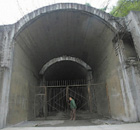Top Stories
Commuters not revved up by change in work schedule
By Cui Xiaohuo (China Daily)
Updated: 2010-04-13 09:30
 |
Large Medium Small |
Traffic congestion was hardly reduced on the first day the city began its flexible work schedule policy for 800,000 government employees.
Commuters said they failed to see any advantage to the policy as tens of thousands of families were forced to change their commuting plans during both the morning and evening rush hours on Monday.
Many drivers said some of the ring roads and other major arterial routes were even more congested than usual on Monday morning. More than 80 sections were jammed during the morning rush, according to the Beijing traffic management bureau.
Although subway authorities prepared additional trains for extended rush-hour commuting, passengers said they were still delayed by overwhelming crowds at major stations citywide.
"There were more commuters on the subway trains and in the stations just before 9 am, the peak of the morning rush. The queues were longer than usual," said Ming Bing, who was traveling by subway from his home in Chongwenmen to his office on Wangfujing on Monday morning.
The new worktime policy asked most government administrations in the capital to postpone working hours by 30 minutes starting Monday.
These public organizations, including more than 800,000 employees of local government institutions, will replace their former opening hours of 8:30 am to 5:30 pm with the new working hours of 9 am to 6 pm.
However, the adjusted office hours did have a positive impact on rush-hour travel for motorists overall, the traffic authorities said.
The peak hour for the traffic flow was delayed about half an hour on Monday morning, the traffic management bureau said late Monday.
The average vehicle speed was 6.3 percent faster between 7 and 8 am Monday, compared with the same date last month. The overall vehicle speed citywide was 1 percent faster during the day, the authority said.
"The traffic flow for the Monday rush hour was divided over an extended period. The general effect of the flexible office hours is positive," a spokesman for the traffic management bureau said late Monday.
The adjusted work-hour policy is among 10 governmental initiatives to ease the strain on the capital's chaotic transport system.
The local authorities rolled out a series of moves earlier this month that include the extension of the current no-car-day ban and raising parking fees in targeted areas.
Some commuters, particularly parents who need to transport their children to and from school, said they found they were wasting more time on the roads. Many said they reluctantly accepted the change.
Drivers during Monday's evening rush hour said they noticed relatively less traffic. But the traffic authority said the traffic congestion might be reduced even more if families deliberately delayed their trips home to avoid the evening peak hour.







